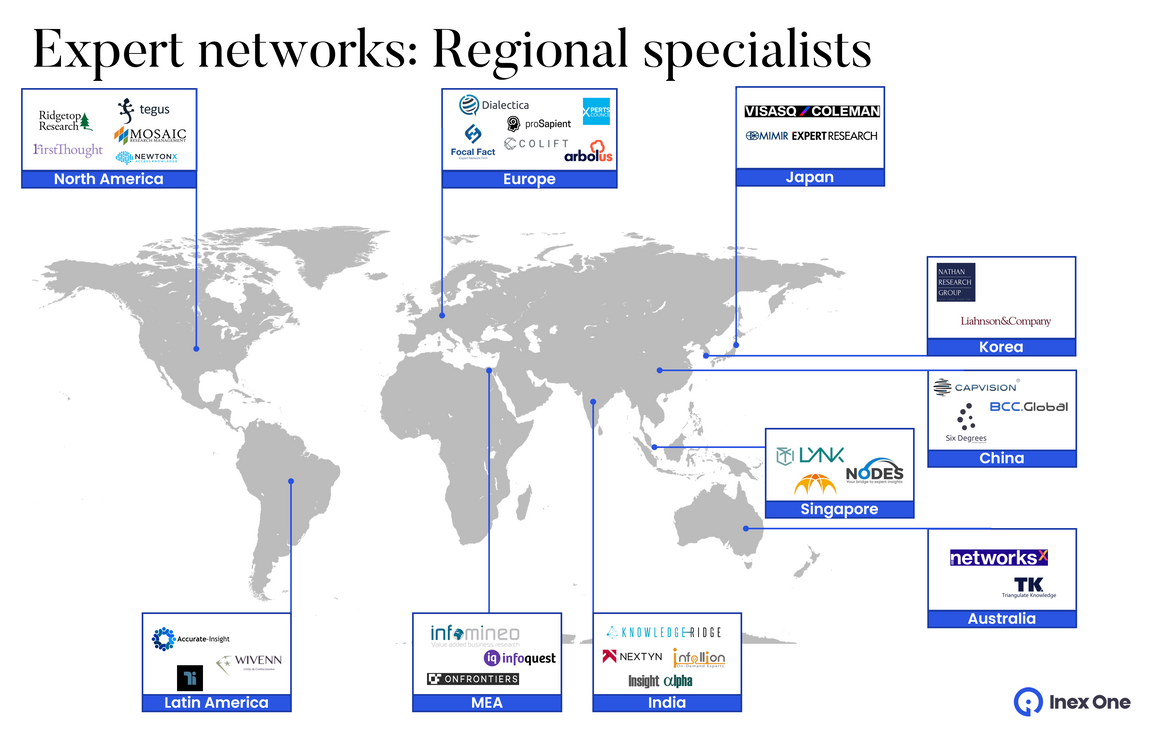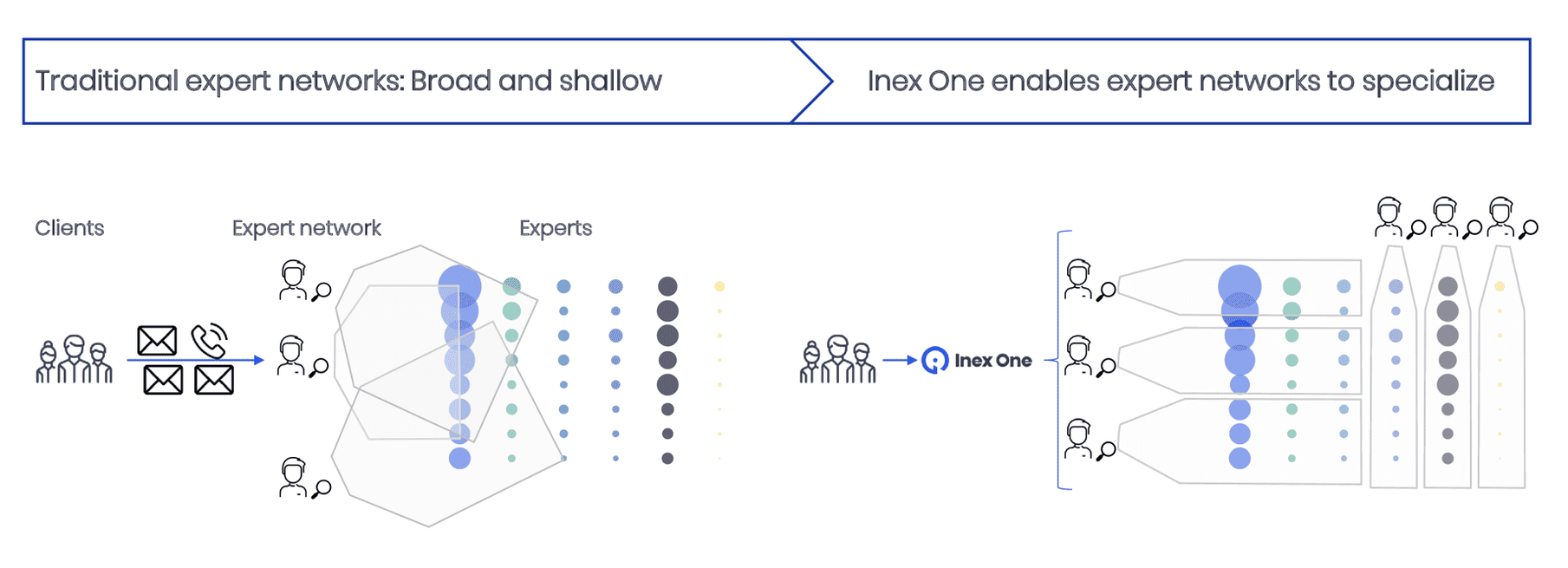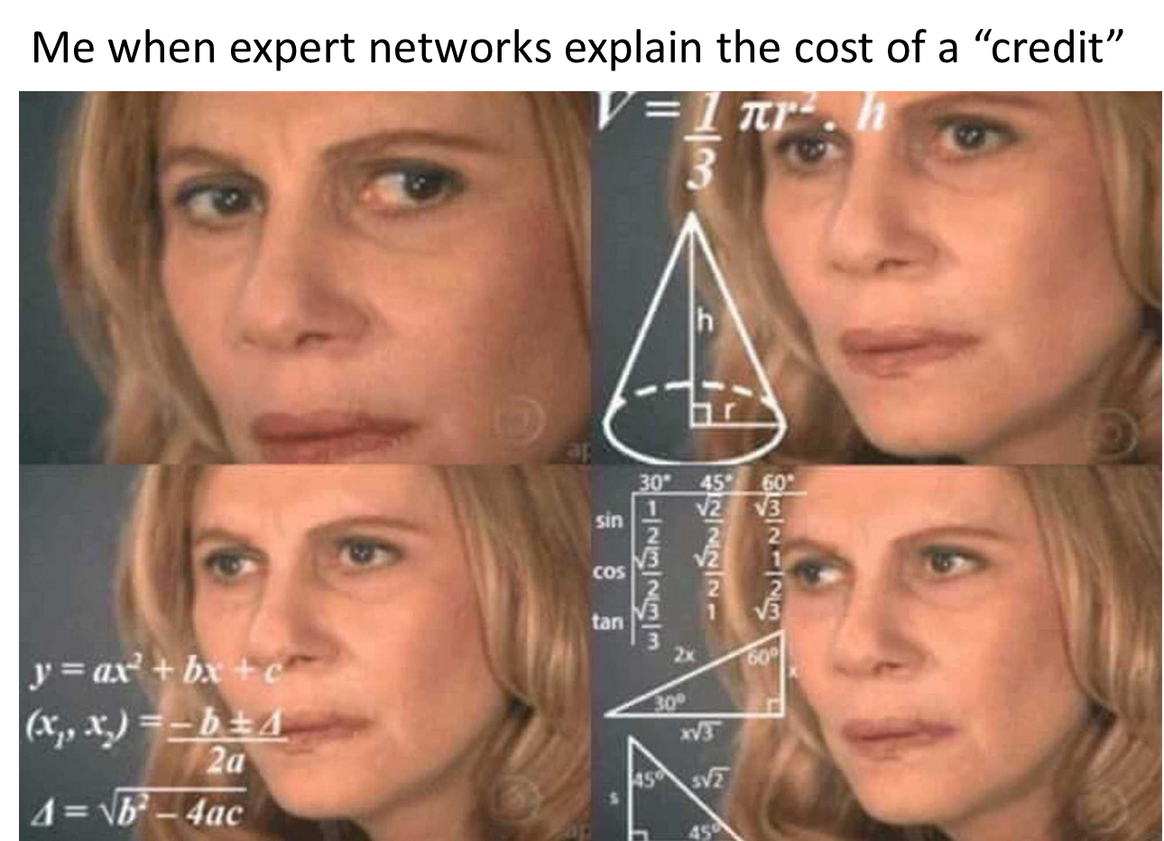18 Apr 2023
Getting started with expert networks

Expert networks are a powerful source of insights, but how do you start using them? There are more than 150 expert networks globally. This makes it difficult to choose the right expert network. So we compiled this starter kit: Expert Networks 101. It helps answer common questions such as:
Which expert network is the best for me?
What is the cost of expert network services?
Which compliance rules apply for expert networks?
What are the alternatives to GLG, Alphasights, Guidepoint and Third Bridge?
1. Which expert network is the best for me?
Different expert networks have different areas of expertise and experience. Their capability to deliver relevant experts is a result of what clients it historically served (and what experts it has recruited for them). Consequently, each expert network has a different geographic footprint and industry depth.
Some expert networks try to do every industry, every geography, with varying success. But let's admit it: I'd much rather work with a Japanese expert network associate to find experts in Japan, than a London-based generalist.

Expert networks: Walmart or Amazon?
Traditional expert networks such as GLG and Guidepoint apply a "Walmart approach" - one shop to sell everything. This works well in their home US market and Western Europe, but less well in other geographies or in niche industries. Instead, a new crop of specialized expert networks have emerged to fill the gap. These firms are capturing market share in the global expert network industry. They include Germany/ DACH expert networks such as Colift, China-focused expert networks such as Six Degrees, Australia-focused expert networks like NetworksX, and Japan-focused ShareFair.
Conveniently, all these firms - and some 20 other specialized expert networks - are available on Inex One. Using the "Amazon approach", you get access to all specialized expert networks in one portal, under one contract.

2. What is the cost of expert network services?
Expert interviews typically range from $700-$1500, depending on the location and seniority of the expert.
On Inex One, prices are clearly shown upfront, and you only pay-as-you-go for interviews made. This is a significant improvement over legacy expert networks such as GLG, Guidepoint and Alphasights.
Those firms require large upfront payments ($50-100k is common) for a pack of "credits". One credit should represent the cost of a typical expert interview. But in practice, interviews cost more (a Dialectica sales rep even admitted their average is 1.25 credits/call). 🙄
This model is very lucrative for the networks, of course. They can negotiate a seemingly low "price per credit" with the Director of Research, but then sell experts at a multiple to their Associates.

As a consequence, many clients are confused over what their actual cost of expert network services is. When switching to Inex one, that becomes clear. This case study shows how one client saved >40% on expert network cost, using Inex One.
Which compliance rules apply for expert networks?
Compliance rules for expert networks support transparency, integrity, and sustainability in the industry. Expert networks implement robust compliance programs to meet regulatory requirements and maintain the trust of their clients and stakeholders. These compliance programs include contracts, dedicated personnel, training of staff and experts, and technology. Broadly speaking, there are six sets of compliance rules for expert networks:
Anti-bribery and corruption laws: These laws prohibit giving or accepting bribes or other incentives to get business or an unfair advantage. Examples include the "Sunshine Acts" for payment to healthcare professionals in many countries, the US Foreign Corrupt Practices Act, and the UK general Bribery Act, which comes with a helpful explainer.
Insider trading regulations prohibit trading based on material, non-public information (MNPI) that you've received in breach of confidence (so called "black edge"). Expert networks ensure that experts don't breach the duty of trust to their employers and won't disclose any such MNPI. And it's in everybody's interest they don't! If an expert inadvertently quips any such MNPI to an investor, the investor cannot trade that stock - lest they commit insider trading. Professional investors build their investment cases over weeks and months - one improper expert call could spoil it all and disqualify them from trading the stock altogether!
Because of this, clients in part rely on expert networks to protect their firm and to only present suitable experts after appropriate vetting and compliance training.Data privacy regulations: Expert networks are veritable confetti machines of PII (personally identifiable information). Importing, processing, and sharing PII is what they do all day long - typically in emails. This used to be cool, until the EU came along with the extraterritorial General Data Protection Regulation (GDPR) and many countries followed suit. Most expert networks have systems to handle PII, but they put their clients in an awkward spot by spraying PII in emails and spreadsheets to the client firms. To comply with the GDPR and similar regulation, firms use Inex One to manage all expert PII in one portal. Here's a free eBook on GDPR for expert network users. 🤩
Conflicts of interest: Expert networks must not arrange consultations where the expert might have a conflict of interest, as it could affect the type and integrity of information shared. For example, an expert must not discuss companies in which they work or have ownership, without explicit approval from that company.
Business ethics: Expert networks must have high business ethics e.g. for maintaining the client confidentiality, sharing accurate and unbiased information, and avoiding any actions that could harm the reputation of the expert network, the experts or its clients. This includes guiding and contracting with experts to not share any confidential information (whether MNPI or other confidential information).
Client requested rules. Some expert network clients have their own rules that they require expert networks to comply with. Here's an example expert network policy (2018 version) from Oaktree, a respected US asset manager. Inex One's Compliance System supports clients to track all consultations across all expert networks, and implement custom flags and compliance rules.
What are the alternatives to GLG, Alphasights, Guidepoint and Third Bridge?
There are more than 150 expert networks worldwide. Choosing the right vendor might feel complicated, and expensive. Inex One solves this by gathering the best expert networks in one portal. Today, more than 400 client firms use Inex One, from Tokyo to Los Angeles.
See a detailed comparison of expert networks like GLG, Alphasights, Guidepoint and Third Bridge to Inex One here.
That's it - you've got the basics and you're all set! Get started using expert networks here.